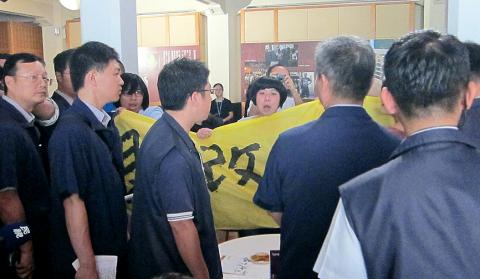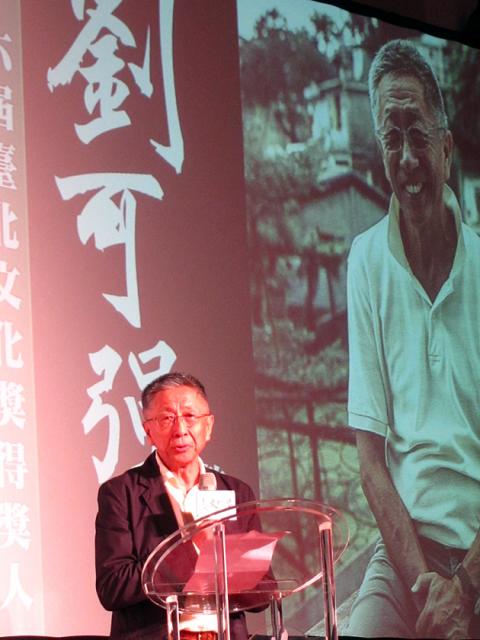Small-scale protests against the Taipei City Government’s handling of urban renewal projects marred the award ceremony of the Taipei Culture Award yesterday, with protesters urging the city government to pay more attention to housing justice in dealing with controversial cases such as the preservation of the Losheng Sanatorium and the urban renewal project in Shihlin District (士林).
Taipei City’s Department of Cultural Affairs yesterday presented the Taipei Culture Award to urban planning activist John Liu (劉可強) and film director Doze Niu (鈕承澤) for their contributions to the preservation of Taipei’s traditions and promotion of the city’s culture through innovative measures.
Liu, an urban planning professor at National Taiwan University, is the mastermind behind reconstruction projects for some of the city’s historical buildings and sites, including Treasure Hill Village (寶藏巖) and Wistaria House (紫藤廬). He also leads an urban design foundation and takes part in various urban reform projects that include the controversial Losheng Sanatorium case.

Photo: Lin Hsiang-mei, Taipei Times
The other recipient, Niu, is a well-known actor and director in Taiwan who gained fame with his two box office hits: Monga (艋舺) and Love (愛).
Describing Liu and Niu as “practitioners of cultural movements in Taipei,” Taipei Mayor Hau Lung-bin (郝龍斌) praised Liu for transforming Taipei’s landscape through urban reform, while lauding Niu for documenting the city’s charm and raising its international profile with his popular movies.
However, the award ceremony was interrupted several times by protesters, with various activists of the Losheng Sanatorium preservation movement waving banners and shouting “Save Losheng Sanatorium” and “Don’t be a culture murderer” while Hau gave his speech in the reception at Taipei Zhongshan Hall.

Photo: Lin Hsiang-mei, Taipei Times
“The Control Yuan’s investigation has confirmed that the sanatorium site is not a suitable site on which to build an MRT maintenance depot. As Mayor Hau said, it is crucial to preserve a city’s history and culture, and so we come here today to urge him to save the historical Losheng Sanatiroum,” said one of the protesters, surnamed Wu (巫), after police escorted the activists from the ceremony.
Losheng Sanatorium was completed in the 1930s on a hill in Sinjhuang District (新莊), New Taipei City (新北市), to isolate people with leprosy, since it was believed to be a contagious and incurable disease at the time.
Before the ceremony began, three advocates for the stalled urban renewal project in Shihlin District, known as Wenlin Yuan (文林苑) project, also launched a small protest outside the ceremony, shouting “save Wenlin Yuan” as Hau entered the building.
The urban renewal project is stalled due to opposition from the Wang (王) family, whose houses were torn down by the city government this year to facilitate the approved project. The family and their supporters have been occupying the construction site and refuse to leave.
Even the band Kao Chiu Ching (拷秋勤), who were invited to perform at the ceremony independent of the protests, called on the city government during their performance “not to sacrifice housing justice over any urban renewal project.”
Liu, in his award acceptance speech, also urged the city government to address the controversial urban renewal projects.
“The city government must take a stance on urban renewal and exercise its authority to resolve the disputes while bearing social justice in mind ... I want to encourage Mayor Hau to take a more positive, active role in handling the issues,” he said.
Meawhile, Democratic Progressive Party Taipei City Councilor Tung Chung-yen (童仲彥) yesterday challenged the city government’s decision to honor Niu for what he described a stereotypical portrait of the old Wanhua District (萬華) in his film Monga, a movie about a group of gangsters from the area.
Department commissioner Liu Wei-kun (劉維公) dismissed Tung’s criticism and said Niu was awarded for his innovation in promoting Taipei and representing life in Taipei, and said the award was not given to him based solely on Monga.

Chinese Nationalist Party (KMT) Chairman Eric Chu (朱立倫), spokeswoman Yang Chih-yu (楊智伃) and Legislator Hsieh Lung-chieh (謝龍介) would be summoned by police for questioning for leading an illegal assembly on Thursday evening last week, Minister of the Interior Liu Shyh-fang (劉世芳) said today. The three KMT officials led an assembly outside the Taipei City Prosecutors’ Office, a restricted area where public assembly is not allowed, protesting the questioning of several KMT staff and searches of KMT headquarters and offices in a recall petition forgery case. Chu, Yang and Hsieh are all suspected of contravening the Assembly and Parade Act (集會遊行法) by holding

PRAISE: Japanese visitor Takashi Kubota said the Taiwanese temple architecture images showcased in the AI Art Gallery were the most impressive displays he saw Taiwan does not have an official pavilion at the World Expo in Osaka, Japan, because of its diplomatic predicament, but the government-backed Tech World pavilion is drawing interest with its unique recreations of works by Taiwanese artists. The pavilion features an artificial intelligence (AI)-based art gallery showcasing works of famous Taiwanese artists from the Japanese colonial period using innovative technologies. Among its main simulated displays are Eastern gouache paintings by Chen Chin (陳進), Lin Yu-shan (林玉山) and Kuo Hsueh-hu (郭雪湖), who were the three young Taiwanese painters selected for the East Asian Painting exhibition in 1927. Gouache is a water-based

Taiwan would welcome the return of Honduras as a diplomatic ally if its next president decides to make such a move, Minister of Foreign Affairs Lin Chia-lung (林佳龍) said yesterday. “Of course, we would welcome Honduras if they want to restore diplomatic ties with Taiwan after their elections,” Lin said at a meeting of the legislature’s Foreign Affairs and National Defense Committee, when asked to comment on statements made by two of the three Honduran presidential candidates during the presidential campaign in the Central American country. Taiwan is paying close attention to the region as a whole in the wake of a

OFF-TARGET: More than 30,000 participants were expected to take part in the Games next month, but only 6,550 foreign and 19,400 Taiwanese athletes have registered Taipei city councilors yesterday blasted the organizers of next month’s World Masters Games over sudden timetable and venue changes, which they said have caused thousands of participants to back out of the international sporting event, among other organizational issues. They also cited visa delays and political interference by China as reasons many foreign athletes are requesting refunds for the event, to be held from May 17 to 30. Jointly organized by the Taipei and New Taipei City governments, the games have been rocked by numerous controversies since preparations began in 2020. Taipei City Councilor Lin Yen-feng (林延鳳) said yesterday that new measures by